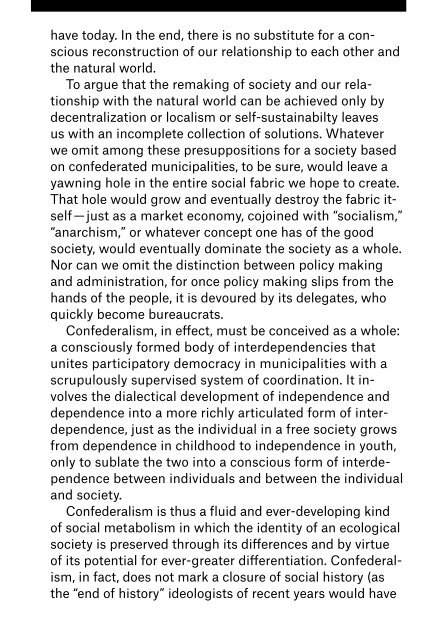Stateless Democracy
1RHiH4Y
1RHiH4Y
Create successful ePaper yourself
Turn your PDF publications into a flip-book with our unique Google optimized e-Paper software.
have today. In the end, there is no substitute for a conscious<br />
reconstruction of our relationship to each other and<br />
the natural world.<br />
To argue that the remaking of society and our relationship<br />
with the natural world can be achieved only by<br />
decentralization or localism or self-sustainabilty leaves<br />
us with an incomplete collection of solutions. Whatever<br />
we omit among these presuppositions for a society based<br />
on confederated municipalities, to be sure, would leave a<br />
yawning hole in the entire social fabric we hope to create.<br />
That hole would grow and eventually destroy the fabric itself<br />
— just as a market economy, cojoined with “socialism,”<br />
“anarchism,” or whatever concept one has of the good<br />
society, would eventually dominate the society as a whole.<br />
Nor can we omit the distinction between policy making<br />
and administration, for once policy making slips from the<br />
hands of the people, it is devoured by its delegates, who<br />
quickly become bureaucrats.<br />
Confederalism, in effect, must be conceived as a whole:<br />
a consciously formed body of interdependencies that<br />
unites participatory democracy in municipalities with a<br />
scrupulously supervised system of coordination. It involves<br />
the dialectical development of independence and<br />
dependence into a more richly articulated form of interdependence,<br />
just as the individual in a free society grows<br />
from dependence in childhood to independence in youth,<br />
only to sublate the two into a conscious form of interdependence<br />
between individuals and between the individual<br />
and society.<br />
Confederalism is thus a fluid and ever-developing kind<br />
of social metabolism in which the identity of an ecological<br />
society is preserved through its differences and by virtue<br />
of its potential for ever-greater differentiation. Confederalism,<br />
in fact, does not mark a closure of social history (as<br />
the “end of history” ideologists of recent years would have<br />
us believe about liberal capitalism) but rather the point of<br />
departure for a new eco-social history marked by a participatory<br />
evolution within society and between society and<br />
the natural world.<br />
Confederation as Dual Power<br />
Above all, I have tried to show in my previous writings how<br />
confederation on a municipal basis has existed in sharp<br />
tension with the centralized state generally, and the nationstate<br />
of recent times. Confederalism, I have tried to emphasize,<br />
is not simply a unique societal, particularly civic or<br />
municipal, form of administration. It is a vibrant tradition<br />
in the affairs of humanity, one that has a centuries-long<br />
history behind it. Confederations for generations tried to<br />
countervail a nearly equally long historical tendency toward<br />
centralization and the creation of the nation-state.<br />
If the two — confederalism and statism — are not seen as<br />
being in tension with each other, a tension in which the nation-state<br />
has used a variety of intermediaries like provincial<br />
governments in Canada and state governments in the<br />
United States to create the illusion of “local control,” then<br />
the concept of confederation loses all meaning. Provincial<br />
autonomy in Canada and states’ rights in the United States<br />
are no more confederal than “soviets” or councils were the<br />
medium for popular control that existed in tension with<br />
Stalin’s totalitarian state. The Russian soviets were taken<br />
over by the Bolsheviks, who supplanted them with their<br />
party within a year or two of the October Revolution. To<br />
weaken the role of confederal municipalities as a countervailing<br />
power to the nation-state by opportunistically running<br />
“confederalist” candidates for state government — or,<br />
more nightmarishly, for governorship in seemingly democratic<br />
states (as some U.S. Greens have proposed) is to blur<br />
the importance of the need for tension between confedera-<br />
124–125



